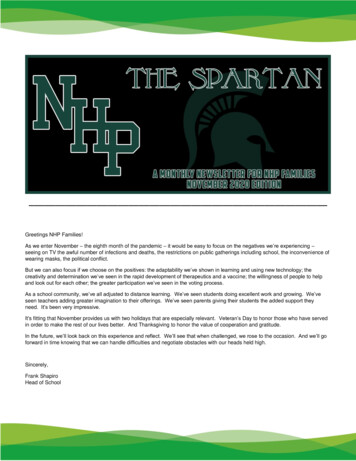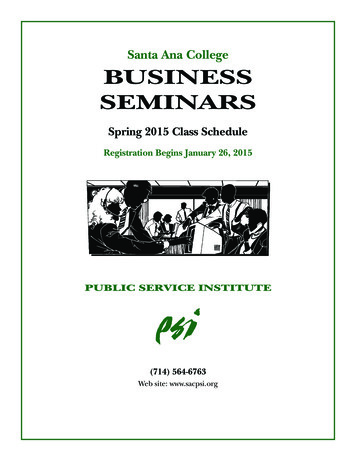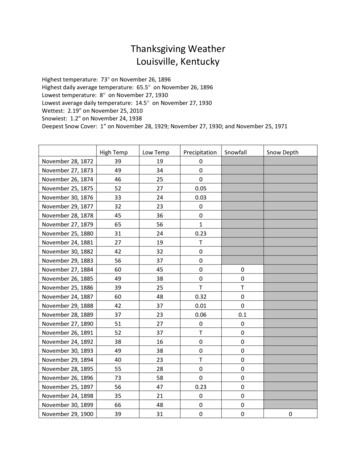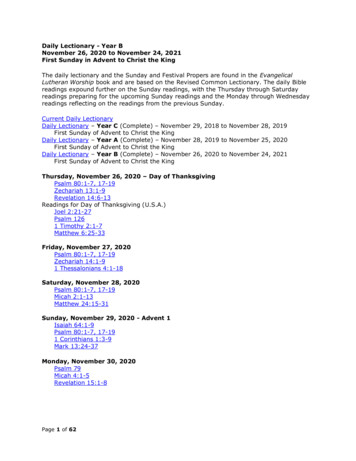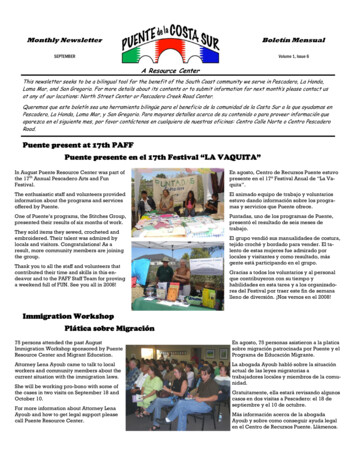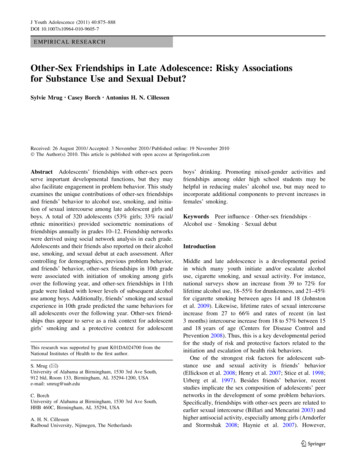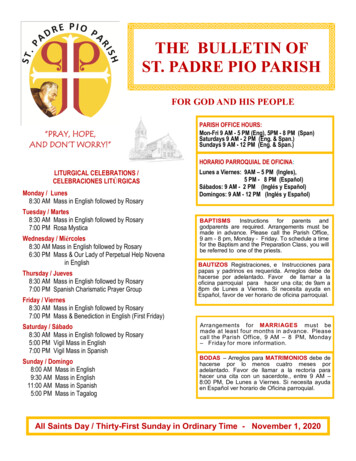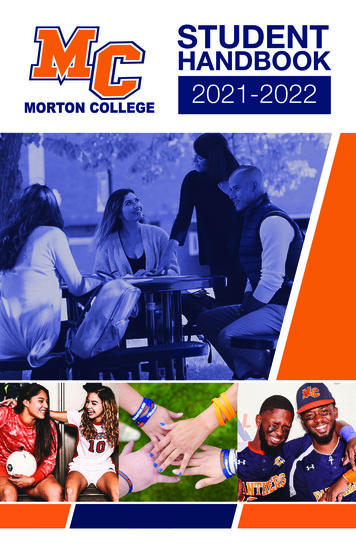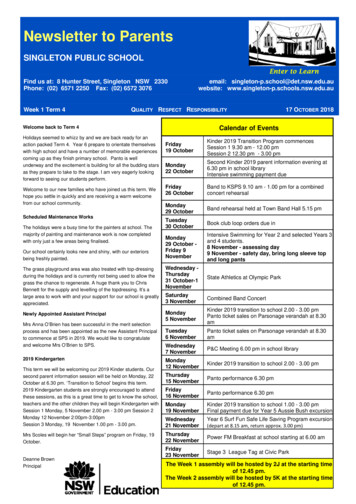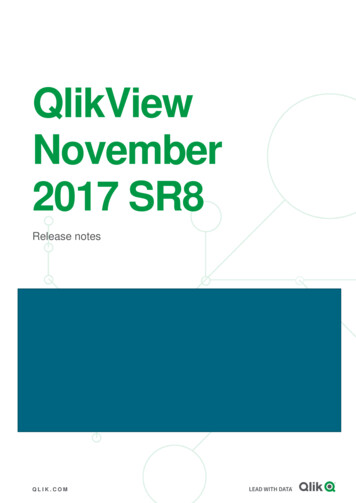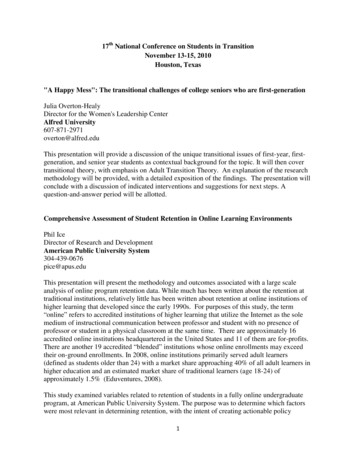
Transcription
17th National Conference on Students in TransitionNovember 13-15, 2010Houston, Texas"A Happy Mess": The transitional challenges of college seniors who are first-generationJulia Overton-HealyDirector for the Women's Leadership CenterAlfred University607-871-2971overton@alfred.eduThis presentation will provide a discussion of the unique transitional issues of first-year, firstgeneration, and senior year students as contextual background for the topic. It will then covertransitional theory, with emphasis on Adult Transition Theory. An explanation of the researchmethodology will be provided, with a detailed exposition of the findings. The presentation willconclude with a discussion of indicated interventions and suggestions for next steps. Aquestion-and-answer period will be allotted.Comprehensive Assessment of Student Retention in Online Learning EnvironmentsPhil IceDirector of Research and DevelopmentAmerican Public University System304-439-0676pice@apus.eduThis presentation will present the methodology and outcomes associated with a large scaleanalysis of online program retention data. While much has been written about the retention attraditional institutions, relatively little has been written about retention at online institutions ofhigher learning that developed since the early 1990s. For purposes of this study, the term“online” refers to accredited institutions of higher learning that utilize the Internet as the solemedium of instructional communication between professor and student with no presence ofprofessor or student in a physical classroom at the same time. There are approximately 16accredited online institutions headquartered in the United States and 11 of them are for-profits.There are another 19 accredited “blended” institutions whose online enrollments may exceedtheir on-ground enrollments. In 2008, online institutions primarily served adult learners(defined as students older than 24) with a market share approaching 40% of all adult learners inhigher education and an estimated market share of traditional learners (age 18-24) ofapproximately 1.5% (Eduventures, 2008).This study examined variables related to retention of students in a fully online undergraduateprogram, at American Public University System. The purpose was to determine which factorswere most relevant in determining retention, with the intent of creating actionable policy1
measures.Participants at this presentation will be presented with the results of the study in context of thehost university. Specifically, transfer credit, enrollment patterns, and course by course gradeeffects were found to have a significant impact on overall retention, accounting for 28% ofvariance. For online learning in general these findings illustrate the tenuous nature of studentpersistence. Participants will be engaged in a discussion of the practical application of thesefindings and how they should be considered as strategic objectives by administrators,counselors and faculty.Participants will also be introduced to the statistical procedures utilized in this study, with afocus on strategies for implementing similar techniques at their institutions. Discussion willalso focus on how effective knowledge management is essential to implement this type ofinitiative in institutions of higher education.Academic Support for Probationary Freshmen: The PASS ProgramKay HaralsonStudent Success Specialist/Associate ProfessorAustin Peay State University931-221-7608haralsonk@apsu.eduMike DunnAdvising Coordinator, Title III GrantAustin Peay State University931-221-7657dunnm@apsu.eduSusan KingAdministrative Assistant/PASS AmbassadorAustin Peay State University931-221-7633kings@apsu.eduInstitutions of higher education are being held accountable more than ever for the success ofour students. Persistence to graduation can only occur if students successfully survive their firstyear. Our university implemented the Promoting Academic Student Success (PASS) program tothrow a life-line to freshmen placed on academic probation and students returning from anacademic suspension.This session will focus on the design of the PASS program, its content and requirements,modifications made to the program each semester, and the initial assessment of itseffectiveness. In this 12-week course students complete an assessment of their study and lifeskills and are provided customized support in areas of weakness. Students participate ininteractive group activities. Academic and personal support and encouragement are provided by2
the PASS course instructor and PASS Ambassador, a student peer mentor assigned to eachclass. The course instructor and PASS Ambassador also lead interactive discussions onacademic success and life skills topics.Modifications have been made to the PASS program each semester as a result of suggestionsfrom the PASS instructors, PASS Ambassadors, and the external evaluator of the Title III Grantwhich provides funding for the program. The main goal of this program is to increase thenumber of at-risk students who achieve success after a weak start to their college career andwho subsequently continue to graduation.Since its inception in spring 2009, students completing the program have experienced greatersuccess than students who did not complete the program. During the first semester the averageterm GPA for students who completed the program increased by 98%, and the retention rate ofcompleters was 81.5%. The average term GPA for students who were required to complete theprogram but did not, decreased an average of 12.5% and their retention rate to the next semesterwas 15%.During the fall 2009 semester, students who passed the course had an average term GPAincrease of 88% and were retained at a rate of 65%. Students who did not complete the PASScourse had an average term GPA decrease of 5% and their retention rate was 35%. In the spring2010 semester, student who completed the PASS course had an average term GPA increase of90%. Students who did not complete the PASS course had an average term GPA decrease of14%. Additional data will be gathered to track the persistence rates of students in the program.The Sophomore Experiences Survey: Latest Findings and ImplicationsLaurie SchreinerProfessor and Department ChairAzusa Pacific University626-815-5349lschreiner@apu.eduThis session will focus on the results of the Sophomore Experiences Survey, an inventory thathas been administered to four-year public and private institutions nationally on an annual basissince 2007. The session will begin with a discussion of what the audience’s perceptions are ofthe needs and issues of sophomores on their own campuses, then will highlight the majorfindings from this year’s survey. In particular, the presentation will emphasize the predictors ofsuccess in the sophomore year. The role that students’ entering characteristics and psychosocialqualities play will be discussed, followed by the extent to which characteristics of the institutionand the experiences that students have in their sophomore year predict their success andsatisfaction. In addition, I will compare the survey results longitudinally, particularlyhighlighting the changes seen in the group of institutions that has participated every year.The remaining portion of the session will be devoted to implications for practice. Four keyareas will be discussed, with best practices and challenges highlighted in each: (1) the3
classroom and the role of the faculty, (2) advising and mentoring relationships, including peeropportunities, (3) co-curricular involvement, particularly in service-learning, cross-cultural andstudy abroad experiences, and student leadership development, and (4) sophomoreprogramming.The session will end with an opportunity for the participants to ask questions and offer bestpractices from their own institutions. A copy of the survey results will be provided to eachparticipant.College Discovery and SEEK Transfer Student Bridge Program: Collaborating for aSeamless TransitionAngela AnselmoDirector of SEEK ProgramBaruch College CUNY646-312-4628Angela Anselmo@baruch.cuny.eduGloria PaulusDirector of Transfer DivisionBaruch a VazquezCollege Discovery CounselorLa Guardia Community College CUNY718-482-5273mvazquez@lagcc.cuny.eduSandra RamosDirector of College DiscoveryKingsborough Community College CUNY718-368-5177Sandra.ramos@kingsborough.eduThe Transfer Bridge Program was created because it was our experience that too many SpecialProgram students were arriving unprepared academically and emotionally for the rigors of thefour-year program at Baruch College. From several student focus groups and feedback fromcounselors, we learned that numerous students despite earning an associate’s degree at theirprospective community college, would have to attend Baruch College for longer than the twoyears they had planned. Students complained that they would have to earn sometimes 24 to 30credits more than they had anticipated. Sometimes this meant another three or four yearsbecause of having taken inappropriate courses at the community college. Students kept tellingus that if only they had known what was required to enter Baruch’s School of Business (the4
Zicklin School) they would have taken the proper courses prior to coming to Baruch. This wassurprising to us because a memorandum of understanding between Baruch College and theCUNY community colleges had been developed in 2006, which elaborated the courses neededfor entrance into Zicklin. Upon further investigation, it was clear that this information was notfiltering down to the counselors or advisors who worked directly with students. It was alsoclear that these courses did not always match up with the majors at the community colleges.In addition, to the academic unpreparedness, we found that students felt lost, lonely and unclearabout Baruch expectations. These students came to the college almost as clueless as most ofour freshmen. Unlike our freshmen however, there were not transfer programs in place to helpwith their transition.The Transfer Bridge Program is an attempt to make the change to Baruch a seamless one fortransfers. This meant developing a program that would signify working with students andcounselors at six CUNY community colleges as soon as the student entered the communitycollege and not wait until the student was admitted to the Baruch. It also entailed getting buyin from each of these institutions and being mindful of the different academic andadministrative structures and policies in each campus.This presentation will describe the processes involved, the objectives and action steps taken atboth the community colleges and at Baruch to build a pipeline for CUNY transfer students. Wewill distribute an example of the PASSPORTS or blue prints that were created to assist studentsif followed to make a seamless transition."Only Connect": A Mixed Methods Study of How First-Year Students CreateResidential CommunitiesRachel Smith (2009-2010 Paul P. Fidler Research Grant recipient)Assistant Professor, Higher Education AdministrationBaruch College, y: NoneSuccessful Transitions: A Four-Year Experience Counseling ProgramTonya SwansonDirector, Counseling ServicesBowie State a Mitchell5
CounselorBowie State led “Successful Transitions: A Four-Year Experience Counseling Program,” thispresentation was developed to present information on the design and impact of the program atBowie State University in Bowie, Maryland. Funded by a Title III grant, the program isdesigned to assist in retention efforts. The presenters will share information on importantcomponents of the program. One component of the program involves the Freshman Seminarcourse, which is taught by members of the Counseling staff, to include the FreshmanCounselor. Additionally, the program includes psychosocial interviews by classification fromthe freshman through the senior year focusing upon adjustment to University life and plans forsuccess upon graduation. Finally, the program consists of topical workshops addressing thedevelopmental needs of students that are facilitated by counselors.The presentation will include descriptive data. The presentation also will discuss the project’smajor objectives in measurable terms and the anticipated results to measure success withspecific tasks and methodologies identified. The presentation will provide comparison data onthe program’s retention rate compared to that of the University as a whole. Additionally, theresults of student satisfaction surveys that evaluate services will be shared. Survey informationwill be presented by gender, classification, resident, commuter, type of visit, and summarystatements. The latter includes statements such as the visit was beneficial or the assistance Ireceived was adequate to meet my needs. Overall, the majority of students rated the experiencepositively. Finally, student development workshops were evaluated by participants to assess anoverall rating, defined objectives, presenter’s knowledge of subject, organization andarticulation, level of participant interaction, management of time, and the quality and value ofthe workshop. Participant ratings of these workshops will be shared.N 1: Defying Retention ConventionKurt StimelingDean of StudentsClarkson University315-268-6620kstimeli@clarkson.eduCathy ClarkAssociate Vice President/Student Success CenterClarkson University315-268-4394cclark@clarkson.eduClarkson University is a rural, small, private, personal, selective, intensely research-driveninstitution. Among our comparison schools, we may share one of those characteristics, but not6
all thus we’re an “N” of one.Clarkson’s tagline is “Defy Convention”. Tapping that strength, Clarkson explored new ways toview our retention “problem”. Our current FY-Sophomore retention is 87%; an enviableposition, from many viewpoints. However, our chief comparative institutions achieve retentionrates 5-10 percentage points higher. How do we rethink what retention is? How do weimplement strategies that work for our institution? How do we partner with institutionstakeholders who may view retention as solely a student affairs issue?We have identified 5 key populations to target with 3 overarching strategies:1. Develop advising models in parallel with faculty advising/mentoring integrated with theStudent Success Center (SSC). The SSC is a suite of offices incorporating the expertise ofAccommodative Services, First-Year Advising and Student Support Services.2. Reform organizational structure and curricula to enhance success among first-year.3. Develop intervention strategies for at-risk students that begin at pre-enrollment and continuethrough the sophomore year.In our presentation, we will generalize the above strategies and detail three initiatives operatedby our Student Success Center. CU Connect Mentoring program assigns university staff member to every first year studentoffering each student the opportunity to connect in a meaningful way with another campuscommunity member. CU Connect provides students with yearlong guidance and support,networking opportunities, and help with the transition to college. College Student Inventory (CSI) an early alert tool designed to enable the SSC and CUConnect Mentors to take a more proactive approach to student retention by assisting studentsentering college for the first time to identify and overcome barriers that can either give thempause or put their educational plans on hold indefinitely. Calling All Knights is an initiative in which the SSC contacts all first-year student families toreach out and ensure that the transition to the university has gone smoothly. Every home iscontacted and feedback from these conversations determines if follow up with the student isnecessary.Executive Function and the Transition to CollegeSarah CrowtherDirector of Student Success and First Year ExperienceCulver-Stockton College573-288-6421scrowther@culver.eduThis presentation will define and explore executive function disorders in college students,especially in the first semester of college. Students who struggle with executive functiondisorders essentially have an invisible disability. Often, these students may be bright, articulateand extremely capable, but are unable to stay organized long enough to complete tasks andperform basic life functions. Some practitioners may think that the student simply does not care7
or may even be lazy, but students with executive function disorders are neither lazy noruncaring. We will discuss common indicators of EF disorders and methods to intervene withstudents who may seem determined to make life their lives difficult, but really lack the timemanagement and organizational skills needed to negotiate the complex demands of college.We will discuss different methods of organization, time management and how these skills relateto writing, note taking and test-taking, but also to personal life. A major obstacle in workingwith students with EF disorders is simply getting them to show up for an appointment, sostrategies for student engagement will also be discussed through case studies and anecdotalevidence.This presentation is relevant to transition because it addresses a 2008 survey I helped conduct atLandmark College. With the permission of AHEAD (Association of Higher Education andDisability), we surveyed the membership and asked what skills were most deficient in thepopulations they served. Overwhelmingly, DSS professionals indicated that executivefunctioning was the most deficient skill set and also indicated that poor executive functioningskills put the student at most risk for college failure, not poor reading and writing fluency. Thispresentation will respond to that survey by giving FYS instructors strategies in supporting thesestudents.Audience participation is anticipated and the goal will be to discuss a few cases practitionersare currently struggling with and to workshop them. Although this is lecture based, audiencequestions and comments will be encouraged. We will examine and problem-solve a case studyon student engagement in small groups to facilitate a larger group discussion.Got Personality? Using Personality Type to Improve Teaching and LearningMarsha FralickProfessor EmeritusCuyamaca Community lity type is a key theme in the student success course at Cuyamaca Community College.The following dimensions of personality type will be presented, discussed and experiencedthrough interactive activities: introvert, extravert, sensing, intuition, thinking, feeling,perceiving and judging.Program Reviews completed over a ten year period from 1995-2005 have shown increasedpersistence of 26% for students who completed the college success course which haspersonality type as a central theme. Additional research has shown that students are morelikely to continue their education if they have clear career goals based on their personality type,interests and values. Students assess their personality type by using an online assessment andthen search a database of careers that match their personality types and interests. Results aredisplayed in an online portfolio which contains assessment results and careers for further8
exploration.In addition to career decision making, knowledge of personality type is used in many ways inthe course. Understanding personal preferences and talents help student with positivemotivation to complete their educational goals. Students analyze personal preferences andrelate them to learning style and strategies for learning new and difficult material in college.They also use the information on personality type to improve time management skills bymatching different time management strategies to their personality types. Understandingpersonality types helps students to communicate with students of diverse personality types.Faculty can use the information on personality type to enhance classroom communication andparticipation.The workshop will be presented in an interactive format with opportunities to engage inpractical classroom exercises designed to increase understanding of personality type.Participants will receive written and online resources for practical classroom activities to helpstudent understand their personality types.Workshop participants will:1. Review personality theory with practical definitions and examples2. Learn about practical applications of personality theory in the classroom: Helping students with making good career decisions Balancing extravert/introvert classroom participation Using teaching methods and assignments to appeal to a variety of learners Improving communication with students Helping students with time management Increasing positive motivation to succeed3. Participate in interactive activities to understand personality dimensions4. Receive practical resources for online and classroom activities.MAP-Works: An Early-Warning Indicator of Student SuccessDarlena JonesDirector of Research and DevelopmentEducational Benchmarking (EBI)417-429-0081darlena@webebi.comValerie McEvoyAssessment DirectorEducational Benchmarking (EBI)417-429-0081vmcevoy@webebi.comSurveys are often useful for campus administrators, but how often are they useful for thecollege student or the front-line faculty/staff? Come to this session to learn how the Making9
Achievement Possible Works (MAP-Works) on-line assessment system contributes to studentsuccess. MAP-Works provides customized feedback to help students establish realisticexpectations and connect with campus resources. It also provides interactive, user-friendly datadirectly to front-line faculty and staff (e.g. residence hall staff, academic advisors, first-yearseminar instructors, or retention committee members) to empower interventions with individualstudents or groups of students. This presentation includes concrete examples, small groupdiscussions and general best practices ideas.How to increase the student success in Precalculus coursesGabriela SchwabAssociate Professor of MathematicsEl Paso Community College915-831-4453gschwab@epcc.eduEmil Daniel SchwabAssociate ProfessorThe University of Texas at El Paso915-747-6758eschwab@utep.eduHelmut KnaustAssociate ProfessorThe University of Texas at El Paso915-747-7002hknaust@utep.eduEl Paso Community College (EPCC) is one of the largest Hispanic-serving community collegein the United States. At the same time, EPCC and the University of Texas at El Paso (UTEP)are de facto the only institutions of higher education within reach for a growing population oflocal students, the overwhelming majority of whom are Hispanic. Due to this constellation, theMathematics departments of both institutions have a long tradition of close cooperation. Wewill report on a new joined initiative, supported by the U.S. Department of Education, tointegrate mandatory Supplemental Instruction (SI) sessions into EPCC's Precalculus courses.The idea of the program is to give students the opportunity to supplement the lecture given bytheir professors, to get a deeper understanding and additional practice in the conceptsintroduced in the classroom, and to get help from fellow students without feeling intimidated bytheir professors or classmates. The instructional mode was changed from the traditional lectureto a new format of lecture with an additional hour of regularly peer-facilitated sessions calledSupplemental Instruction (SI) labs. Graduate students from the Department of MathematicalSciences at UTEP are serving as SI leaders for this Supplemental Instruction component atEPCC. A large portion of these graduate students started their academic career at EPCC andwill therefore be able to act as role models for their EPCC peers. Our poster will introduce indetail the concept and practice of mandatory Supplemental Instruction in Precalculus I and II10
courses. This strategy is aimed at helping freshmen students adjust to the unfamiliar learningexpectations they experience at the college level and at increasing student knowledge of thecourse material, thus improving student success and reducing the student drop-out rate for thesecourses.From their houses to our halls: Shaping the social culture of a first year students.Mark JannoniAssociate Dean of StudentsEndicott College978-232-2115mjannoni@endicott.eduHow can institutions effectively communicate the standard for a positive social culture for firstyear students? This interactive session will present a two step program starting with summerorientation and into the first year seminar class designed to raise the bar of communitystandards. This roundtable will summarize the factors deemed imperative to be part of anyinstitution’s orientation and first year seminar class in order build a community based onrespect and responsibility. Participants will discuss how this model could be used within theirown institution.Orientation is the first chance for institutions to convey their message to new students andfamilies. This seminar will present several methods to create a positive social culture for firstyear students by asking the following questions: What standard does the institution want to set for new students? What is the most effective means of communication to deliver this message? When is the best time to set the tone for the first year community?The presenter will summarize what the research says about the key elements of a successfulorientation and how this model could be used in planning future orientations and first yearseminar courses. At the conclusion of the presentation component of the session, the group willhave the opportunity to discuss their institution’s models, ask questions and get feedback by thepresenter and the participants.International Students: Cultural Complexities of Research and LibrariesAnn BrownInstruction, Outreach and Reference Librarian IIIGeorge Washington University202-994-1351agbrown@gwu.eduDeborah GasparInstruction Coordinator11
George Washington University202-994-1333dgaspar@gwu.eduInternational students entering the American university setting as freshmen are confronted withan array of transition issues that are not readily or easily addressed by traditional first-yearprograms. International transfer students, on the other hand, face a differing set of transitionalissues, even when coming from the community college setting. In both cases, culture,educational history and language can serve as barriers to success.Cultural differences can contribute to misunderstanding in an academic research setting.Examples include mores about asking for help from a member of the opposite sex, which isproblematic as librarianship is a predominantly female occupation, to academia’s expectationsof research knowledge and application for incoming students. Perspectives on censorship andacademic integrity differ significantly across cultures.Two key transitional courses will be highlighted: English for Academic Purposes, whichintroduces international students to the pedagogy and rigor of American universities; andUniversity Writing which is a required first-year writing and research intensive course that isdesigned to foster the transition to academia. We will also discuss the work of the UniversityWriting Center where issues related to academic integrity are addressed.As librarians, the presenters engage with international students in multiple settings. Within theclassroom we apply pedagogical principles within our own instruction to help mediate allstudents’ transitions to academia. We also work to address student assumptions of libraryservices, knowing that they are informed by prior experience, such as closed stacks or mediatedresearching. Our experience has shown that it is critical to intercede and acknowledge cultureas a possible barrier to a new culture of inquiry.International students contribute differing perspectives and experiences to the classroom thatenrich learning for all. We will discuss how pedagogy built on constructivism engages thesestudents by valuing past knowledge and experience. This approach provides opportunities forall students to examine their assumptions, challenge prior learning, and retain new learning. Asinternational students bring a wide array of backgrounds to our university settings, thisapproach validates them while introducing them to American academic culture.Developmental Advising: Creating a culture that serves the developmental learner needscollege wideLori FairDean, Academic AffairsHarrisburg Area Community College717-780-2475lafair@hacc.edu12
Michael WilliamsAssistant Professor, CounselingHarrisburg Area Community College717-780-2492mbwillia@hacc.eduAdvising is a fundamental aspect of college life; however, institutions across the nation haverecognized that there is a tremendous need to create a "learning community" or other learningopportunities for this special population. Implementing Intrusive Advising strategies collegewide as a means to set the tone for campus culture, is our challenge. We must learn how toteach and advise this generation of students who work full or part time; have children; may be aspouse and overall have many more "hats" to wear outside of the classroom. This discussionwill center on exploring how campuses are dealing with developmental education and their useof First Year Experience courses for this cohort. We will focus on campus culture andinfrastructure. We will discuss how campuses are administering their developmental educationprograms as well as how are campuses advising developmental students (to include coursesstudents may take).Student Success and College Success CoursesLori FairDean, Academic AffairsHarrisburg Area Community College717-780-2475lafair@hacc.eduSummary: NonePurp
Baruch College CUNY . 646-312-4628 . Angela_Anselmo@baruch.cuny.edu . Gloria Paulus . Director of Transfer Division . Baruch SEEK . 646-312-4649 . Gloria.paulus@baruch.cuny.edu . Marsha Vazquez . College Discovery Counselor . La Guardia Community College CUNY . 718-482-5273 . mvazquez@lagcc.cuny.edu . Sandra Ramos . Director of College Discovery
